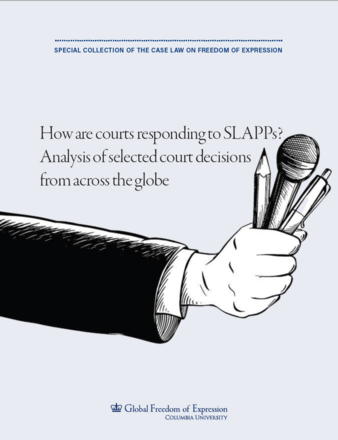
Strategic Lawsuits Against Public Participation (SLAPP) represent a growing concern for the media, civil society and human rights defenders worldwide. Mostly initiated by powerful actors, such as politicians or businessmen, SLAPPs are a form of abusive litigation aimed at silencing critical voices on issues of public interests, by intimidating and harassing journalists, media outlets, activists and civil society organisations.
To counter the threats posed by SLAPPs, some countries, such as the United States and Canada, have adopted specific anti-SLAPP laws. Similarly, in 2020, the European Commission has launched the Anti-SLAPP Initiative with the aim to adopt an anti-SLAPP directive, while the Council of Europe has put forward a set of recommendations for the protection of journalists and other public watchdogs.
In countries that lack dedicated legislation, courts are crucial actors in providing protection against SLAPPs. This study provides an overview of some cases of the South African Constitutional court, the Inter-American court of Human Rights and the European Court of Human Rights, where the judiciary played a key role in countering vexatious lawsuits and protecting fundamental rights such as freedom of expression and civic activism. While courts contribution has been pivotal in many cases, legislative reforms are needed to guarantee a stronger protection against SLAPPs.
Legislative reforms are indeed crucial to address SLAPPs at an early stage and avoid lengthy and expensive trials. A comprehensive anti-SLAPP legislation should include, for example, measures to establish a high threshold for public interest reporting, reduce defence costs, and create effective deterrents against vexatious lawsuits.
The study also highlights the necessity to decriminalize defamation laws in line with international freedom of expression standards, and the urgent need to provide specific training to judges, especially in lower courts, to recognize SLAPPs and apply relevant human rights standards.
Finally, it mentions international and regional human rights bodies as key actors that can provide stronger guidance to states in addressing SLAPPs, for example by providing thematic reports, resolutions, guidelines, and collections on best practices for the judiciary.
Tags: SLAPP Freedom of expressionThe content of this article can be used according to the terms of Creative Commons: Attribution-NonCommercial 4.0 International (CC BY-NC 4.0) . To do so use the the wording "this article was originally published on the Resource Centre on Media Freedom in Europe" including a direct active link to the original article page.

